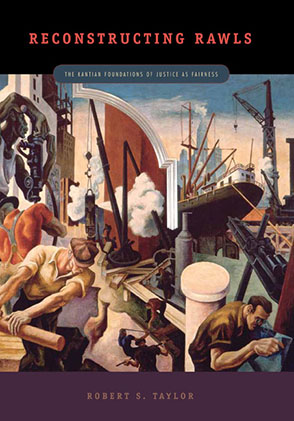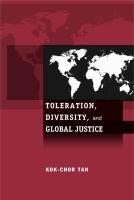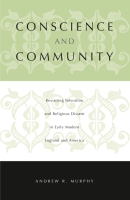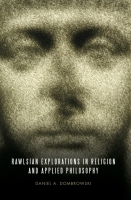Reconstructing Rawls
The Kantian Foundations of Justice as Fairness
Robert S. Taylor
“Taylor goes against the grain of much Rawls scholarship in arguing that the Rawlsian framework for liberal justice should revert more thoroughly to its Kantian roots. Taylor’s critical reinterpretation of liberal theory will challenge those theorists who view Rawls’s political turn as a necessary accommodation of pluralism and social difference. Indeed, Taylor argues that Rawls abandoned his Kantianism at his peril. The scholarly and bold line of argument developed here is one with which all theorists currently engaged with the alleged promise or shortcomings of the liberal project will have to grapple.”
- Description
- Reviews
- Bio
- Table of Contents
- Sample Chapters
- Subjects
“Taylor goes against the grain of much Rawls scholarship in arguing that the Rawlsian framework for liberal justice should revert more thoroughly to its Kantian roots. Taylor’s critical reinterpretation of liberal theory will challenge those theorists who view Rawls’s political turn as a necessary accommodation of pluralism and social difference. Indeed, Taylor argues that Rawls abandoned his Kantianism at his peril. The scholarly and bold line of argument developed here is one with which all theorists currently engaged with the alleged promise or shortcomings of the liberal project will have to grapple.”
“There has been a lot of debate and discussion among those who work on liberalism and on Rawls in the last decade and a half about the differences between and relative advantages of what Rawls calls comprehensive vs. political liberalism and Galston calls Enlightenment vs. Reformation liberalism. Taylor gives a strong defense of an unabashedly comprehensive, Enlightenment liberalism and shows how fitting Rawls's substantive principles of justice into that framework both sheds light on what they require and, he argues, what they assume about the nature of persons. Taylor's Kantianized Rawls recovers with gusto the spirit of liberalism as a fighting creed against intolerance, injustice, and despotism.”
“In Reconstructing Rawls, Robert Taylor develops a sophisticated reading of Kant's moral theory and uses it to critically reconstruct Rawls's justice as fairness. In doing so, he generates many original insights and illuminates the work of both authors. His careful and clear discussions of autonomy and self-realization provide a foundation for Rawls's principles, including the frequently neglected principle of fair equality of opportunity, and their strong lexical ordering. This is a powerful call to embrace a comprehensive Kantian foundation for justice as fairness.”
“Reconstructing Rawls provocatively resurrects the issue of Rawls’s Kantian ties and finds a unique approach in the well-trodden ground of the literature on Rawls’s reliance on Kantian metaphysics. . . . This book is one that calls for attention from those who thought that the issue of Rawls’s Kantian conception of the person had been settled. Taylor presents new and challenging reasons to think that we ought to question even Rawls’s own claims that he need not rely on Kantian metaphysics, given the importance of that metaphysics to the justification of Rawls’s principles of justice.”
“This is an ambitious and provocative book that will be of interest to political philosophers who have reservations about the enormous influence that Rawls’ defense of political liberalism, in his later writings, has had on much recent political philosophy. . . . The book is a welcome addition to political philosophy and will play a useful role in stimulating discussion about the foundations of contemporary liberalism.”
“In this intriguing study, Taylor . . . faults Rawls's liberalism on the grounds that it is insufficiently universal—justice as fairness being at bottom a circumscribed political conception vying for allegiance in a world distinguished by many reasonable, irreconcilable, and comprehensive metaphysical doctrines of the good life. Taylor has an eye toward reconstructing the promising though allegedly impoverished theory along the lines of a global liberalism that derives from a Kantian notion of the morally autonomous person—a notion that Rawls himself partially endorses but ultimately develops in a different, nonuniversal direction. Central to Taylor's project is a correlative reconstruction of Kant. The author aims to provide a practical postulate of freedom at once detranscendentalized yet foundational in yielding a first principle capable of generating, in Rawlsian contours, persuasive arguments on behalf of autonomy and fairness. These arguments may prove efficacious beyond Rawls's preeminent domain of the liberal democratic society. At the same time, Taylor acknowledges the difficulty, if not impossibility, of overcoming the pluralism that, in Rawls's view, decisively militates against universalism. Nevertheless, Taylor maintains that attempts to articulate universalistic liberalisms are well worth the effort.”
“Taylor’s spirited championing of a universalistic form of liberalism . . . is especially intriguing and provocative, as well as particularly relevant to recent discussions of ‘American exceptionalism’ in its relation to other countries and cultures. . . . [This] book is essential reading for scholars of Kant, Rawls, and liberal theory in general. Taylor’s contribution to scholarship in these areas is indeed significant and his arguments extraordinarily challenging.”
Robert S. Taylor is Associate Professor of Political Science at the University of California, Davis.
Contents
List of Illustrations
Preface and Acknowledgments
Abbreviations
Acronyms
Introduction
Part 1: Kantian Affinities
1. Rawls’s Kantianism
Part 2: Reconstructing Rawls
2. The Kantian Conception of the Person
3. The Priorities of Right and Political Liberty
4. The Priority of Civil Liberty
5. The Priority of Fair Equality of Opportunity
6. The Difference Principle
Part 3: Kantian Foundations
7. Justifying the Kantian Conception of the Person
8. The Poverty of Political Liberalism
Conclusion: Justice as Fairness as a Universalistic Kantian Liberalism
Bibliography
Index
Introduction
In his essay “Two Concepts of Liberalism,” William Galston distinguishes between two varieties of liberal theory. The first—Enlightenment liberalism—stresses the development and exercise of our capacity for autonomy, understood as “individual self-direction” and entailing a “sustained rational examination of self, others, and social practices”; this is the liberalism of not only Kant and Mill but also a number of contemporary thinkers, including Don Herzog, Stephen Macedo, Jeremy Waldron, and the preeminent Kantians (Barbara Herman, Christine Korsgaard, Onora O’Neill, Allen Wood, etc.). The second—Reformation liberalism—emphasizes diversity and the toleration that encourages it, where diversity is understood simply as “differences among individuals and groups over such matters as the nature of a good life, sources of moral authority, reason versus faith, and the like”; this is the liberalism of not only Madison and Isaiah Berlin but also contemporary thinkers such as Galston himself, Charles Larmore, and Donald Moon. These two varieties of liberal theory are often mutually supporting—as Galston puts it, “the exercise of autonomy yields diversity, while the fact of diversity protects and nourishes autonomy”—but in a surprising number of cases they conflict, whether over the accommodation of group difference, the design of civic education, or the promotion of liberal values internationally. In fact, much of the so-called liberalism/multiculturalism debate is an intramural affair, pitting Enlightenment and Reformation liberals against one another.
One might reasonably ask where John Rawls, arguably the greatest political philosopher of the twentieth century, would fall in this debate. He certainly had many Enlightenment-liberal credentials: he taught several famous Kantians (e.g., Herman, Korsgaard, and O’Neill), lectured on Kant extensively, and characterized his magnum opus, A Theory of Justice (1971), as “highly Kantian in nature.” By the same token, though, Rawls’s later work Political Liberalism (1993) “applies the principle of toleration to philosophy itself,” thus taking a diversity-based approach that has been a major influence on such Reformation liberals as Galston, Larmore, and Moon. We might therefore understand Rawls’s intellectual trajectory as the opposite of the historical one: it begins with the Enlightenment and ends by circling back to the Reformation.
This depiction of his trajectory is far too crude, however. Political Liberalism may be a Reformation-liberal text, but is Theory really an Enlightenment-liberal one—or, more precisely, is it a Kantian-liberal one? Many scholars have called Rawls’s Kantian credentials into question, including Kerstin Budde, Otfried Höffe, Oliver Johnson, Larry Krasnoff, and Andrew Levine (see Budde 2007, Höffe 1984, Johnson 1974, Krasnoff 1999, and Levine 1974). Other scholars (e.g., Larmore) have discerned certain justificatory ambiguities in Theory, such as the commingling of Enlightenment-liberal and Reformation-liberal elements. Most importantly, Rawls himself saw a strong continuity between the arguments of Theory and Political Liberalism, suggesting that the Kantianism of the former work may have been oversold, not only by himself but by others as well.
I will therefore begin in chapter 1 by showing just how Kantian Rawls was during his most Kantian period—roughly, from Theory of Justice to his “Kantian Constructivism in Moral Theory” (1980) and “Social Unity and Primary Goods” (1982). I demonstrate here that Rawls’s theory is even more Kantian in this period than has generally been recognized: from his Kantian conceptions of person and society to his construction procedure (including the formal constraints of the concept of right, the veil of ignorance, and the thin theory of the good) and on through the principles, institutions, and psychology of justice that this procedure generates, his insights track those of Kant nearly one for one. Alternative readings of Theory and other works of this period are possible—as Rawls himself argues and as I will show in chapter 7—but their essentials are profoundly and almost unremittingly Kantian.
The interpretive work of chapter 1 provides the essential backdrop for the reconstructive task of part 2 (chapters 2–6), which shows just how dependent Rawls’s arguments for the most distinctive features of justice as fairness—namely the lexical priorities of right, political liberty, civil liberty, and fair equality of opportunity plus the difference principle—are upon his extreme and controversial Kantian conception of the person. Its very extremity and controversiality will only become clear, however, in the process of (re)constructing his arguments for these features: through a procedure of “backwards engineering,” I will show that any conception of the person that is capable of grounding the arguments for these features must be one that is itself grounded in Kant’s model of finite rational agency, properly elaborated. These reconstructions of Rawls’s arguments are required because either (1) they are incomplete (as with the priority of liberty and the difference principle) or (2) they are basically missing (as with the priority of fair equality of opportunity). Moreover, the principles of justice that these arguments sustain play such a central, consistent role in the various incarnations of Rawls’s theory—from Theory (1971) and Political Liberalism (1993) to Justice as Fairness: A Restatement (2001)—that flaws in their justification imperil his evolving political project. This reconstructive task occupies the heart of my book, supported by the prior interpretive work of chapter 1, which not only offers materials for this task but also assures us that a Kantian reconstruction does no violence to Rawls’s texts.
I begin this task in chapter 2 by presenting a more detailed and comprehensive Kantian conception of the person than Rawls uses in his own works, but one that is required to justify his theory’s most distinctive features. This conception of the person, based upon Kant’s own model of finite rational agency, is a hierarchy of Kantian conceptions of autonomy: in descending order, they are Kantian moral autonomy, Kantian personal autonomy, and Kantian self-realization. The constituent conceptions of this hierarchy offer the most compelling interpretations of their parent concepts and can be reached along both deductive and inductive routes. The first route utilizes a procedure analogous to Rawls’s four-stage sequence to derive the lower conceptions from higher ones along with their associated plans and rules, while the second constructs an ideal cognitive-developmental psychology, an epicyclic system using an iterative model of agency to explain the emergence of higher conceptions from lower ones. This hierarchy of Kantian conceptions will be used in later chapters to ground a parallel hierarchy of lexical priorities, with the priorities of right and political liberty at the top, the priority of civil liberty in the middle, and the priority of fair equality of opportunity (or FEO) at the bottom. This rich system of relationships is depicted graphically in figure 1. Notice that all priorities as well as their grounding conceptions of autonomy can be traced back to a Kantian conception of moral autonomy—a result anticipated by Kant in his Groundwork, as I shall argue (see GMM 4:415–17).
Chapters 3 through 6 then review the various arguments Rawls makes for the distinctive features of his theory and show that only those arguments securely grounded on the hierarchical conception of persons presented in chapter 2 offer genuine promise. Chapter 3 does this for the priorities of right and political liberty, arguing that they are founded on a Kantian conception of moral autonomy and also that (contrary to Rawls’s assertion in his famous “Reply to Habermas”) political liberty takes priority over civil liberty in his theory, giving it a somewhat civic-humanist character (PL 206, 413). Chapter 4 reveals the grave inadequacy of two of his three arguments for the priority of (civil) liberty and shows how the third and most promising one, which grounds this priority on a Kantian conception of personal autonomy, can be bolstered. Chapter 5 offers for the first time a defense of the priority of fair equality of opportunity—which is entirely (and peculiarly) missing from the corpus of Rawls’s texts—a defense that is constructed with existing resources in Theory (including the Aristotelian Principle and the concept of Humboldtian social union) and grounded on a Kantian conception of self-realization through work, which has Marxist undertones. Finally, chapter 6 explicates and gives additional support for his notorious difference principle. I contend here that his latter-day defenses of the difference principle (especially those present in Justice as Fairness: A Restatement) are inadequate and that the most compelling case for it can be made by means of a reconstructed version of an earlier defense—namely, the formal one elaborated in Theory §26 (see esp. TJ 132–35). This reconstructed defense relies, though, on a whole series of Kantian assumptions about asceticism, the unavoidable ends of duty and finitude, and the essential nature of persons. As one moves through these five reconstructive chapters, the extent to which justice as fairness depends upon specifically Kantian presuppositions becomes increasingly apparent, strongly reinforcing the conclusions of chapter 1.
In part 3 of the book, I turn to “reflective equilibrium,” Rawls’s innovative technique of moral justification, and to its role in vindicating his Kantian conception of the person. In chapter 7, I describe this technique, developed in both Theory and “The Independence of Moral Theory” (1975), and point to its ambiguous treatment of moral objectivity. This ambiguity is reflected in Rawls’s evasive answer to a central question: how can we bring about a coincidence of reflective judgments among moral agents, which he maintains is “a necessary condition for objective moral truths” (IMT 290)? One answer suggested by Rawls—namely, a reliance on “self-evident first principles,” like Kant’s practical postulate of freedom—is rejected during the 1980s in favor of another: by way of preexisting (near) consensus on considered convictions of justice found in “a democratic society under modern conditions” (IMT 289; KCMT 305–6). I enumerate Rawls’s powerful reasons for rejecting the first answer and then describe in great detail the mature theory that he eventually developed from the second answer in Political Liberalism.
In chapter 8, I contend that the Reformation-liberal answer given in Political Liberalism to the above question—roughly, that justice as fairness can serve as the focus of an overlapping consensus of the reasonable comprehensive doctrines present in modern liberal democracies—is impoverished in at least two senses. First and more narrowly, no comprehensive doctrine but the Kantian one is capable of endorsing the strong Kantian conception of the person that underwrites justice as fairness. Thus, no overlapping consensus on justice as fairness is possible; the best that can be hoped for is an overlapping consensus on a class of liberal political conceptions of justice, with justice as fairness as just one competitor conception among others, its centrality determined through political competition and the strength of the supporting socioeconomic interests. Second and more broadly, even if we assumed justice as fairness could act as the focus of an overlapping consensus, the system of justification involved would offer us little moral guidance, whether in a domestic or an international context, regarding the appropriate width and content of overlapping consensus: because political liberalism has no independent criterion of reasonableness, it cannot refuse extension of the scope of toleration to include illiberal, even indecent groups and nations. Moreover, its agnosticism regarding the width and content of overlapping consensus, which is a form of cultural relativism, would lead to a dramatically diminished role for political philosophy, effectively turning it into a handmaid of the social sciences. These are sharply revisionist claims, of course, but I believe they are borne out by the chapter’s arguments, which as a whole suggest the profound poverty of political liberalism and Reformation liberalism more generally.
Finally, the conclusion offers an alternative way to answer the question of justification, showing that a Kantian conception of the person must, unsurprisingly, be grounded in a Kantian way: on a practical postulate of freedom as a necessary presupposition of finite rational agency. I argue here, however, that this defense need not rely upon Kant’s transcendental idealism, that is, we can dispense with metaphysics in grounding Kantian liberalism—even the “thin” metaphysics of Kant—rendering the postulate potentially ratifiable by a wide variety of persons as well as belief systems. This justificatory approach is Rawls’s “road not taken,” and by following it ourselves, we can turn justice as fairness into an authentically comprehensive and universalistic liberalism, thereby fulfilling the implicit promise of Theory and helping secure its place within the canon (Frost 1969, 105).
Even if this reconstruction of Rawls’s Kantian liberalism is found uncompelling by some persons, it can still be seen by them as a worthy companion to other cosmopolitan Enlightenment liberalisms—for example, Millian plural-perfectionism, Benthamite or Sidgwickian liberal utilitarianism, and Lockean religious liberalism—in the fight against illiberal principles and institutions around the globe, including theocratic, secular authoritarian, and totalitarian regimes and their sustaining ideologies. While Reformation liberalism is virtually impotent in such contexts, too unsure of its own relevance in illiberal societies, universalistic Enlightenment liberalisms are not hobbled by such doubts. Their very diversity is a source of strength, in fact, because different Enlightenment liberalisms are likely to appeal to different individuals, groups, and societies. As I contend in the conclusion, these liberalisms offer us the vision of a liberal world order (“a republicanism of all states, together and separately,” as Kant put it) and a mode of justification addressed to all men and women as human beings, not as members of various religious, racial, and national groups (MM 6:354). Their optimistic cosmopolitanism makes them worthy of our allegiance and—if the arguments of this book are sound—makes the Kantian liberalism of a reconstructed Rawls the most worthy of them all.
Mailing List
Subscribe to our mailing list and be notified about new titles, journals and catalogs.








